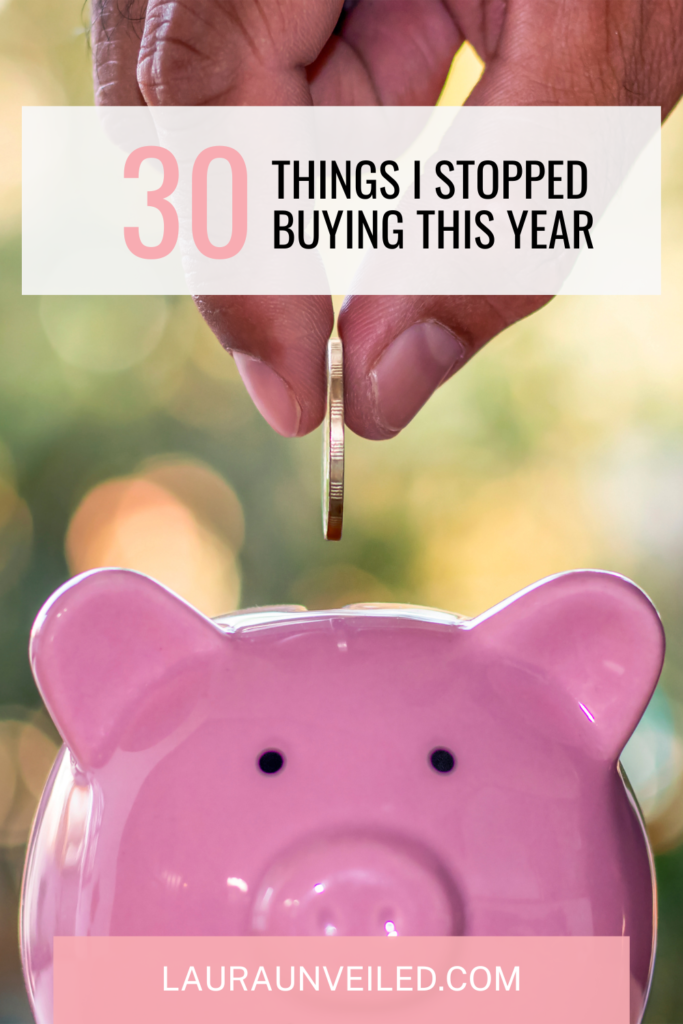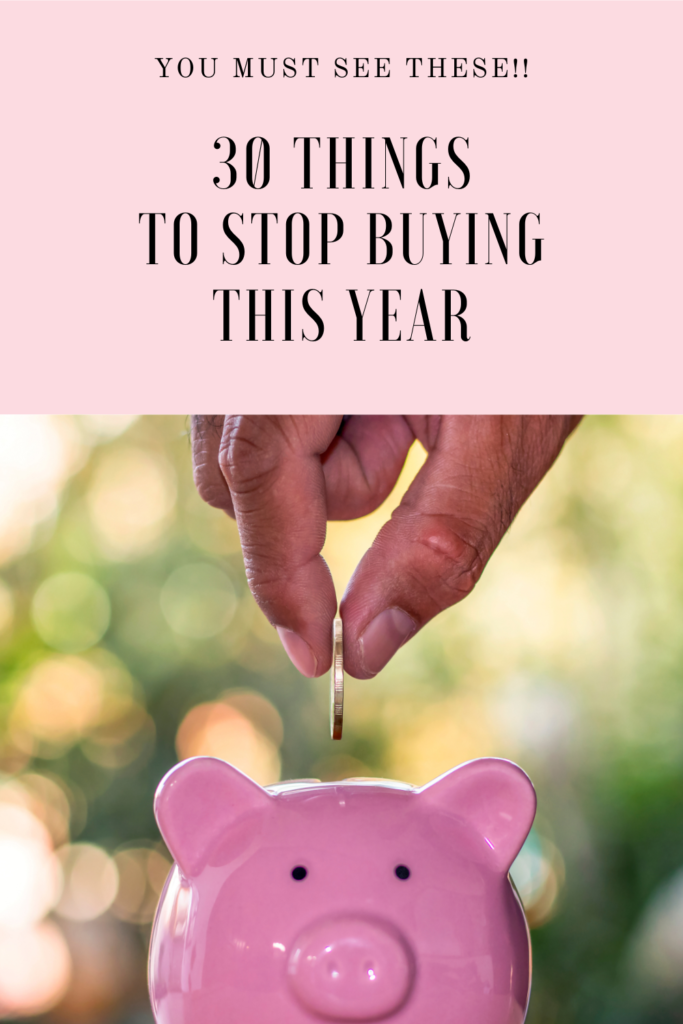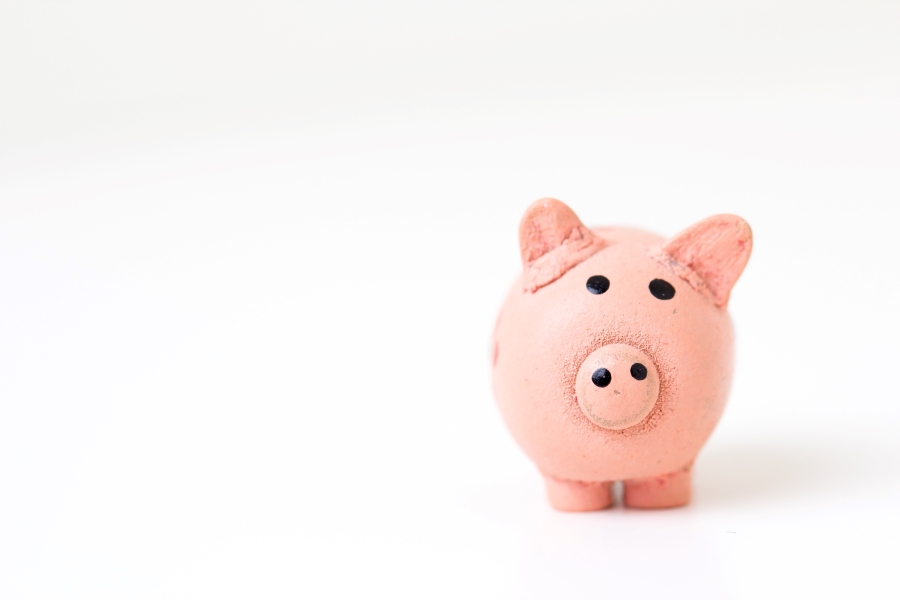What things should I stop buying to save money?
I believe I’m not the only one who spends a lot of money on stuff I don’t need. So today I want to focus on the simple things I stopped buying to save money.
We all know that feeling of reaching the end of the month and wondering where all our hard-earned money went.
In this blog post, I’m going to spill the beans on some common items that you can easily stop buying to fatten up your wallet.
Trust me, I’ve been there and done that, and I’ve got some fabulous tips to share.
Now, let’s get real for a moment.
We live in a consumer-driven world, surrounded by enticing advertisements that lure us into buying things we don’t really need. But I’m here to help you break free from those spending traps.
By making a few simple adjustments to your shopping habits, you’ll be amazed at how much money you can save.
These are things that might not be costly when you look at them separately, but if you pay for them frequently, they will be costly in the long run. Most of them are also bad for the environment.
Now let’s move on to my list of things I stopped buying to save money.
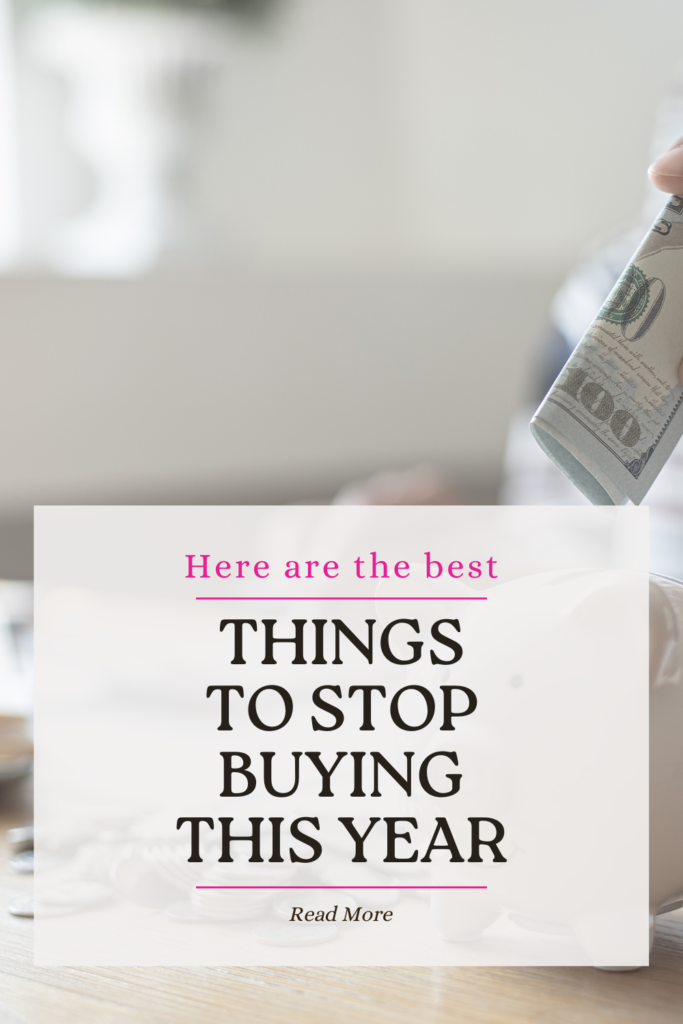
This post may contain affiliate links. That means that if you click on a link and purchase something I recommend, I will receive a small commission at no extra cost to you.
30 things you should stop buying or paying for right now
1. Apps
There’s absolutely no reason to pay for apps unless you’ve done the research and can’t find an alternative free app.
Whatever app you need, do yourself a favor and Google if there’s a replacement for this app that you can install without charge.
This is one of the easiest things I stopped buying or paying for because most apps have a free alternative.
2. Bank fees
If you’re paying monthly account-keeping fees, then it’s time to switch banks.
There are so many options for accounts with no transaction fees that there’s really no reason to pay your bank to keep your money.
If you really like your bank and don’t want to switch, call or email them before switching and see if they can cancel your fees.
If they can’t, switch banks. It’s not a difficult process, and you’ll be saving money every month without even realizing it.
3. Bottled salad dressings
Did you know that making your own dressing is not only cost-effective but also incredibly easy?
With just a few simple ingredients from your pantry, like olive oil, vinegar, herbs, and spices, you can whip up a delicious and customized dressing that will take your salads to the next level.
4. Bottled water
I believe that in most areas, tap water is now safe to drink. You can avoid buying bottled water for many reasons. Bottled water is really bad from an environmental standpoint.
It takes up to 1000 years for a plastic bottle to decompose, and as bottles decompose, they leak harmful chemicals into the environment.
Did you know that in the United States, 1,000 people open a bottle of water every second?
Americans throw away 35 BILLION empty water bottles a year, and only 12% of these bottles are recycled. This is not good for the environment.
Another reason not to drink bottled water is the cost. According to research, the average American spends over $100 on bottled water (per year).
This is pretty crazy, and this cost could be much higher for some people because, just like with everything else, there’s cheaper bottled water and more expensive bottled water.
To stop paying for environmental waste, invest in a reusable water bottle to carry your water with you, and use a water filter at home to filter your water.
My absolute favorite is this motivational water bottle, and I would also recommend this well-known yet quite affordable water filter pitcher.
5. Buying groceries every day
When you go shopping, you suddenly spot a new KitKat flavor you haven’t seen before, then you see a new washing detergent that smells like heaven, and all of a sudden, you see that your store sells a black cherry-flavored soda you haven’t tasted before (the story of my life).
You leave the store, having wasted money on unimportant stuff that doesn’t benefit you or your health at all.
When we talk about things I stopped buying, this is the most important one, as it saved me tons of money.
To avoid impulse buying, come up with a meal plan, create a shopping list, and stick to it. You can even order groceries and other stuff online so that you don’t have to go to the land of temptation (aka the store) yourself.
If you have Amazon Prime, you’ll get free 2-hour delivery from Amazon Fresh.
6. Cable TV
Let’s be honest—we shouldn’t watch TV as much as we do. It might seem like a good idea, but watching TV is honestly a waste of time.
TV decreases our productivity, and we shouldn’t pay for wasting our time as much as we do now.
From what I’ve heard, cable TV costs over $50 per month in America. Instead of cable, get a Netflix or Hulu subscription.
With a Netflix or Hulu subscription, you can still watch whatever you want, wherever you want, whenever you want.
There are a lot of educational documentaries and movies available, so watch these instead of reality TV to keep your mental health in good shape.
7. Cleaning products
Most cleaning products are full of hazardous chemicals. Instead of buying all those poisonous products, make your own.
If you buy a few lemons, vinegar, some castile soap, and baking soda, you can make an amazing all-purpose homemade cleaner that doesn’t cost a lot and is safe both for you and the environment.
8. Disposable dishes
I know how easy it is to buy disposable dishes when you’re feeling lazy. You buy a pack of disposable dishes, eat from them, and then throw them away, and the problem is solved.
However, such acts are bad for both the environment and your wallet.
Instead of that, invest in ceramic dishes. If you’re on a budget, Amazon has the cutest 18-piece set that’s made of natural wheat straw and PP material. It’s not too expensive, and the beige set looks really cute.
9. Fast fashion
We’ve all been guilty of snagging a trendy piece from a fast fashion store, only to have it fall apart after a few washes or go out of style faster than you can say “fashion emergency.”
Opting for timeless, high-quality pieces isn’t only a smart financial move but also an opportunity to express your personal style in a more sustainable manner.
Look for well-made garments crafted from durable fabrics that will withstand the test of time.
Invest in classic pieces like a well-tailored blazer, a little black dress, or a versatile pair of jeans that you can mix and match for years to come.
Trust me, building a curated wardrobe filled with quality pieces will make you feel like a fashion icon without breaking the bank or contributing to the harmful cycle of fast fashion.
10. Greeting cards
Think about it: when you create a card from scratch, you’re not only saving money but also pouring your heart and soul into a unique masterpiece.
It’s an opportunity to show your loved ones just how much they mean to you.
Grab some colorful cardstock, markers, glitter, and any other craft supplies that tickle your fancy. Let your imagination run wild as you sketch, paint, or collage your way to a one-of-a-kind creation.
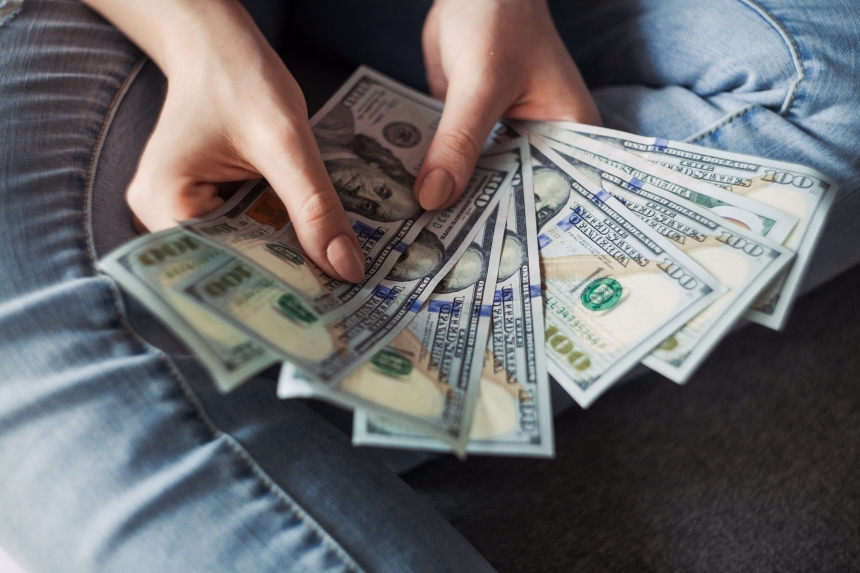
11. Gym membership
This tip does not apply to you if you’ve bought a gym membership and visit the gym frequently. However, most of us purchase a gym membership and then visit the gym once a month.
This is not very beneficial, as you’re wasting money on something you’re not even taking advantage of. Besides, gym memberships aren’t the cheapest.
Don’t forget that you can work out at home as well. I personally prefer working out at home because I don’t like strangers watching me as I work out.
Besides, you don’t need tons of heavy equipment to exercise at home. Resistance bands are one of the best and cheapest investments you can make to make your home workouts more enjoyable.
Resistance bands are compatible with a variety of popular workout programs, including yoga, Pilates, and others.
I use these resistance bands because they’re quite cheap yet durable, and since there are different resistance levels, you can start with the easiest one and slowly build up.
12. Haircuts, manicures, and pedicures
The Internet is full of awesome tutorials on how to cut your own hair and do your own manicures and pedicures. These are skills that can be learned easily.
If you absolutely must visit a hairdresser or a beautician, consider going to an intern or trainee.
They still work under the supervision of qualified hairdressers, but their wages are significantly lower.
13. Hardcopy books
I’m a huge bookworm. However, even I don’t usually read one book more than once. Except for the Harry Potter books, because I’m such a Potterhead. These are the only books I would own in hard copy.
Instead of buying hardcopy books, which are usually much more expensive, buy e-books instead. Amazon offers Kindle eBooks, and most of them are pretty cheap.
For those who don’t know, a Kindle is an electronic reader that lets you read books, magazines, newspapers, and other types of media.
If you read a lot, then a Kindle is something you should think about getting, as these are designed just for reading, unlike tablets.
14. Lottery tickets
Lottery tickets or scratch-offs are a waste of money. Your chances of winning are like 0.0000000001%, and you KNOW it. The odds are almost never in your favor.
You’re buying them to win a lot of money, but funnily enough, this is one of those things I stopped buying to save money, and you should too.
You’ll have a much higher chance of getting rich by starting a blog or a side business.
These are fun things, and you’ll have control over how much you earn because everything is in your hands and up to you.
15. Movie tickets
Going to the movies is fun and a great way to spend time with your friends or family, but there are cheaper options to enjoy high-quality time together, such as walking, playing board games, or cooking together.
Imagine how much money you could save if you ditched cable, stopped buying expensive movie tickets, and bought a Netflix or Hulu subscription instead.
16. Paper towels, napkins, and disposable dishcloths
Instead of paper towels and disposable dishcloths, use reusable dishtowels.
A package of paper towels might seem cheaper than reusable dishcloths, but if you buy a package every month, it will be more expensive in the long run.
Invest in nice-looking textile napkins and dishcloths, and you won’t regret it.
17. Plastic bags
You don’t need to buy a new plastic bag every time you go to the mall. Instead of that, buy a reusable grocery bag.
If you buy a bundle, then you can leave one bag in your car, one in your handbag, and one in your coat pocket, so that you will always have a shopping bag with you wherever you go, and there will never be any need to buy a plastic bag.
18. Pre-cut fruits and vegetables
We all know that convenience comes at a price, and pre-cut produce is no exception. Those neatly packaged containers may save you a few minutes in the kitchen, but they also come with a higher price tag.
So, why not save some bucks by buying whole fruits and veggies and putting in a little extra effort? Not only will you enjoy fresher produce, but you’ll also have the satisfaction of slicing and dicing it yourself.
19. Pre-packaged food
I’ve seen a lot of stores sell fruits that are pre-packaged. There’s absolutely no need to wrap oranges, lemons, or bananas in plastic. Don’t support that kind of act.
20. Single-serving coffee pods
While those convenient pods have become a morning ritual for many, they can take a toll on both your wallet and the environment.
You can consider using a reusable coffee pod. These nifty little gadgets allow you to fill them with your favorite ground coffee, providing the same convenience without the hefty price tag or excess waste.
Alternatively, why not embrace the charm of the French press?
This classic brewing method not only saves you money but also delivers a rich, flavorful cup of coffee that will make you feel like a coffee specialist.
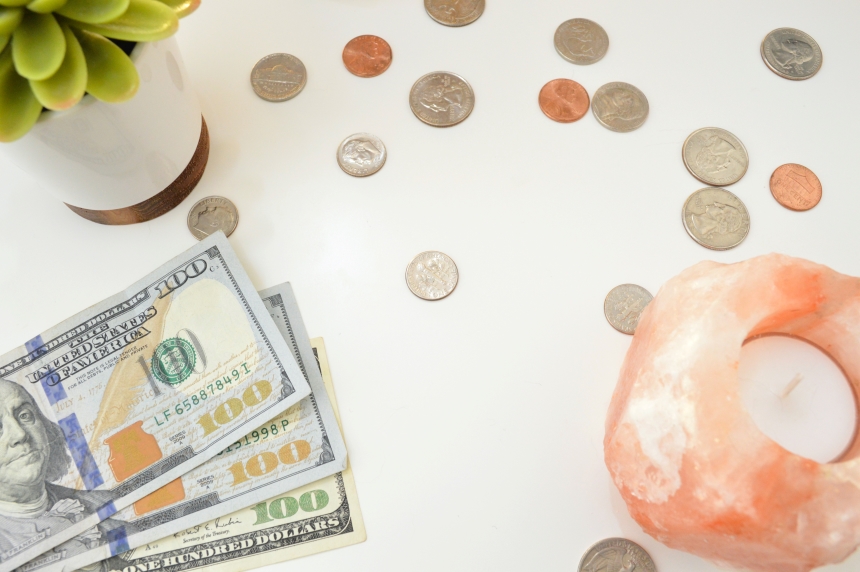
21. Single-use batteries
We all know how frustrating it is when we’re in the middle of a task or enjoying a gadget and suddenly the batteries die on us.
By making the switch to rechargeable batteries, you’ll not only save money in the long run, but you’ll also reduce your impact on the environment.
These handy little powerhouses can be recharged hundreds of times before they need replacing, which means fewer trips to the store and less waste piling up in landfills.
22. Stop buying cute decor items
Yes, those cute figurines that you can get from Zara Home at 50% off are also on my list of things I stopped buying. They only collect dust.
Unless it’s something that has a really special meaning for you, it only sparks your attention and interest the moment you buy it.
You’re euphoric about how cheap you got it, not the item itself. You’ll forget about it later, and it’s a waste of money.
23. Stop buying online without getting cash back
We’ve reached an era where we’re basically paid for shopping.
There are multiple websites and apps that give you real cash for your everyday purchases when you shop and pay on a website or an app.
Every time you buy something with Ibotta, you’ll earn real cash back. I personally take it as a discount on things I buy.
24. Stop buying things because they are on sale
It’s really hard to resist a good sale, right? You see something that’s 50–70% off, and you HAVE to buy it before the price goes back to the original price.
Is the sale price really a sale price? Well, let me tell you something you already know.
To keep people interested, retail stores tend to use a certain technique.
They pretend to offer different discount campaigns by setting the original price higher and pretending that the discount price is 50% off or whatever, but it’s actually similar to or even higher than the original price.
It’s a pure scam, and it happens more often than you realize.
25. Stop eating out so much and ordering takeout or fast food
Ordering takeout is convenient and easy, and you’ll save yourself the hassle of washing the dishes. However, if you order takeout or eat out every day, you’ll spend a lot of money without realizing it.
Homemade meals are often cheaper, more delicious, and much healthier. Check out this post about easy recipes to find some cheap yet delicious meal ideas.
26. Stop borrowing money
Taking a loan is a serious decision, and you should carefully consider the risks. When you borrow money, you often have to pay back the original amount plus some interest.
The interest can be pretty high, and the loan might not improve your overall situation in the long run.
27. Stop subscriptions you don’t need
We’re all subscribed to something we’re not even aware of.
I used to have an online magazine subscription that was like $5 a month, which didn’t seem like a huge amount of money, but if you look at the bigger picture, I paid $60 a year for something I didn’t even use.
Whether it’s a gym subscription, a magazine subscription, or an online service subscription, if you don’t need or use it, then cancel it!
Trim helps you find and cancel unwanted subscriptions and manage your wallet.
28. Store-bought lunches
Whether you’re heading to work or school, buying pre-packaged lunches can quickly drain your wallet.
Packing your own meals not only saves you money but also gives you the opportunity to enjoy delicious, budget-friendly creations.
29. Takeaway coffee, tea, or hot chocolate
I’m not saying you can’t drink coffee outside at all; I’m just saying you don’t need to buy takeout hot drinks every morning before you go to work.
Instead of that, invest in an affordable coffee machine, buy a thermos bottle, bring your own coffee with you wherever you go, and buy takeaway hot beverages only as a treat.
An average hot beverage costs about $3–$5, so if you ditch that expensive habit, you can save over $100 a month. Can you tell me it’s not another one of those things you don’t need?
30. Women’s razors, shaving cream, and deodorants
I recently heard about the pink tax, which basically means that feminine products cost significantly more because they’re meant for women.
With the exception of price differences, there is no difference between the male and female versions of personal care products.
A good example is a single-blade, cheap razor.
The men’s “version” is blue, and the women’s “version” is pink. The ONLY difference between these products is the color, yet women’s razors cost significantly more.
It’s not the only thing that’s notably costlier. The same applies to deodorants, shaving cream, body wash, and shampoos—you name it.
To avoid the pink tax, don’t be afraid to buy men’s razors and shaving cream. The shaving cream might have a more masculine smell, but the product works just as well as the women’s one; it’s only cheaper.
That’s it for my list of things I stopped buying to save more money.
Before you leave, make sure to check out my blog post about incredibly good spending habits.
Don’t forget to pin!
